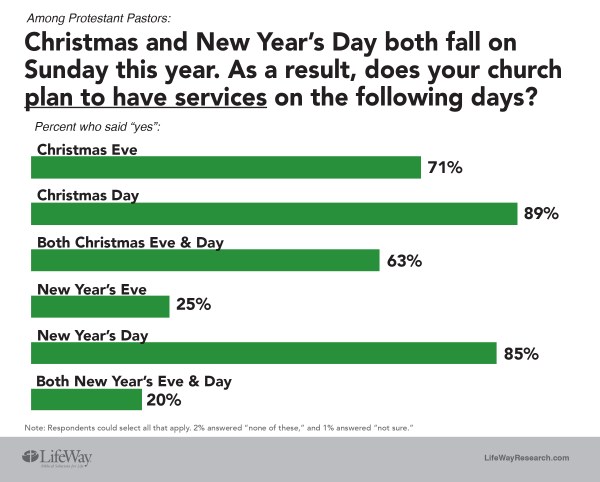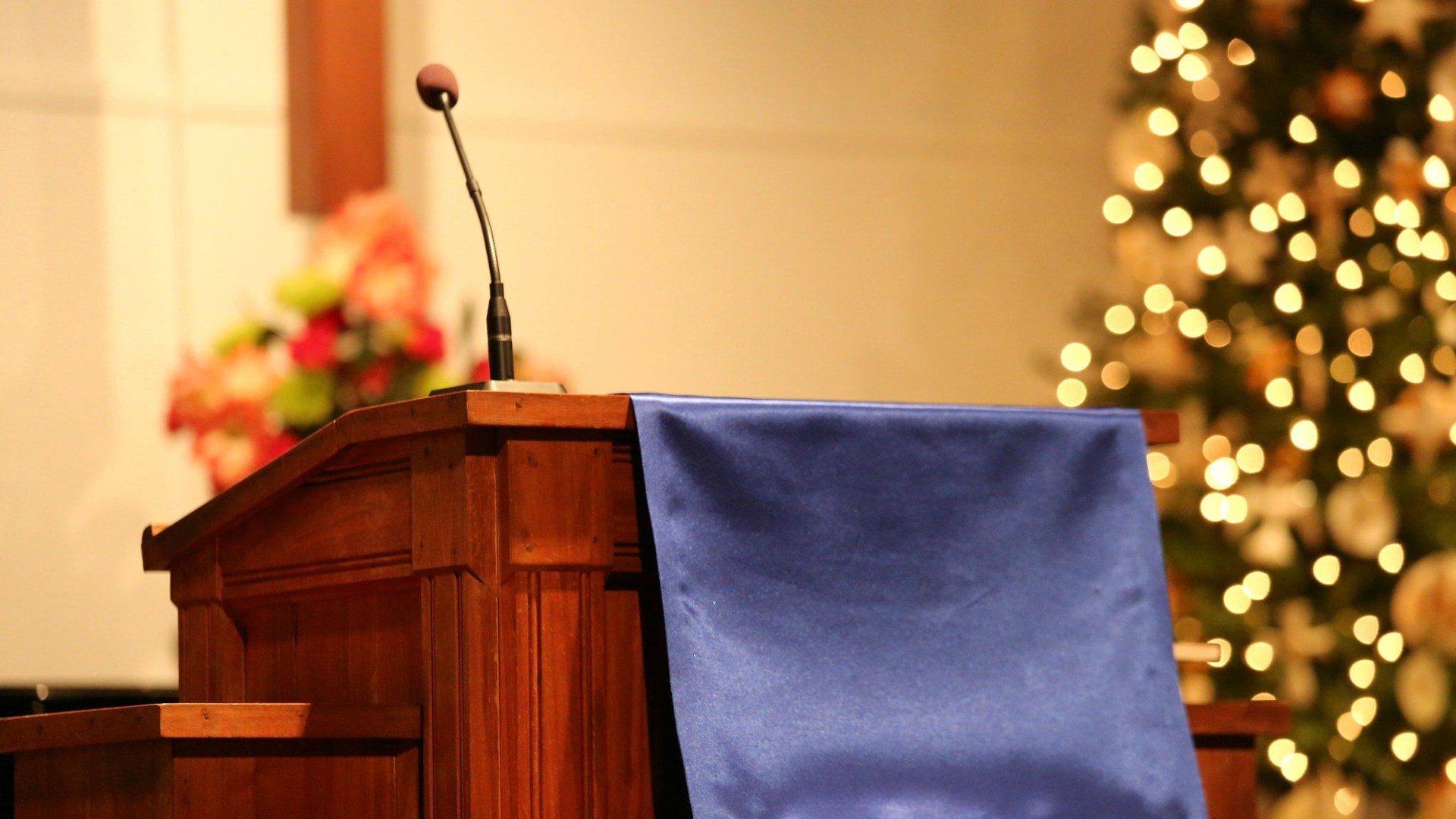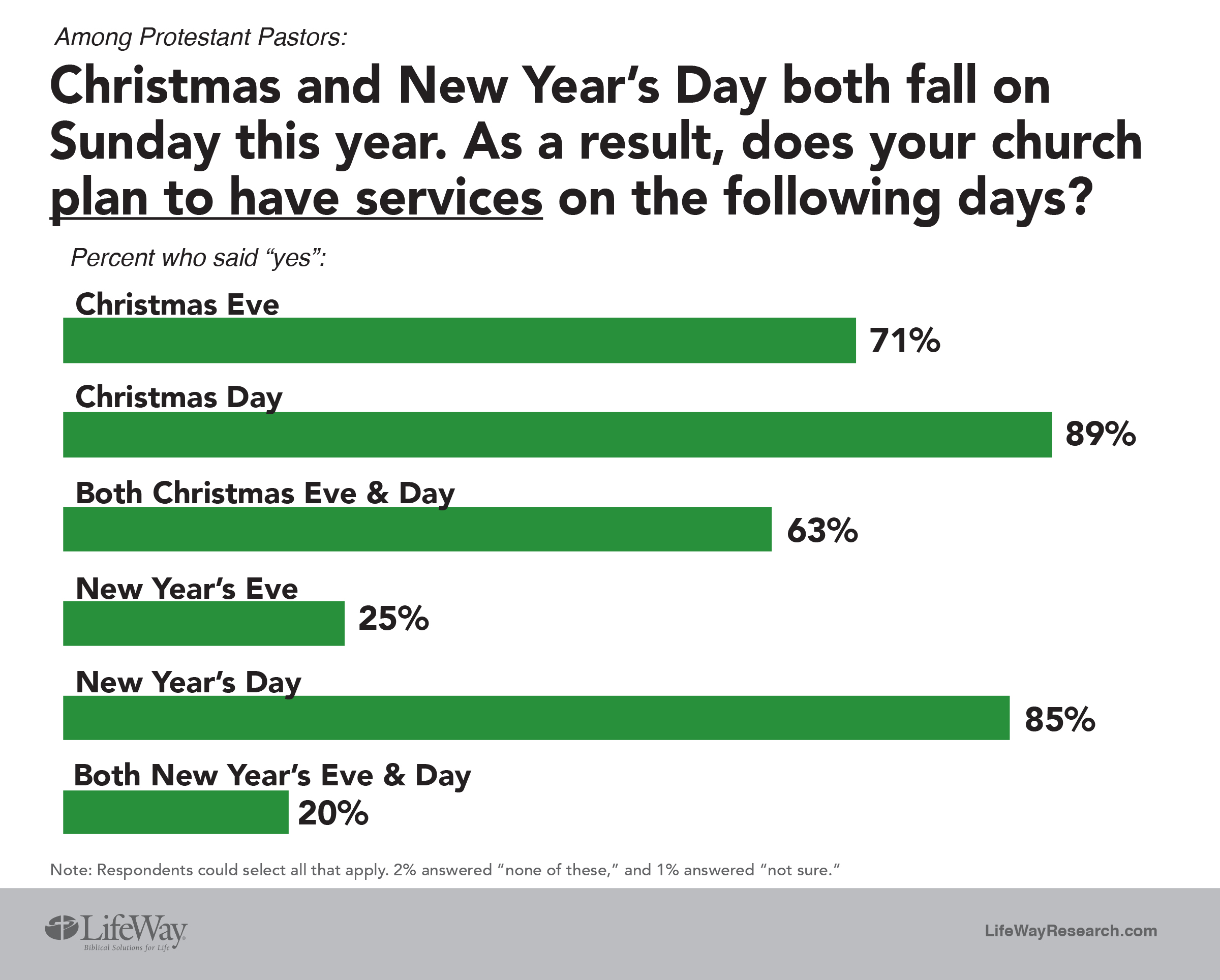Nearly 9 out of 10 Protestant senior pastors say their churches plan to hold services on Christmas Day and New Year’s Day, as both fall on a Sunday, according to a recent survey from Nashville-based LifeWay Research.
More than 7 in 10 Protestant senior pastors say their churches plan to hold Christmas Eve services. And more than a few will be open on New Year’s Eve.
“Christmas is one of the busiest times of the year especially at churches, with many churches having extra Christmas Eve services and special programs,” said Scott McConnell, executive director of LifeWay Research. “If Christmas falls on Monday through Saturday, churches might be closed on December 25—but almost never on a Sunday.”
The Christmas season has become a major outreach focus for many churches, with more than half of Americans saying they visit church for Christmas. Many of those who don’t go usually to church are open to an invitation during the holidays, according to previous LifeWay Research studies.
At some influential megachurches, thousands of visitors will flock to special Christmas events. In the past, that’s led some to cancel worship when Christmas falls on a Sunday. But few pastors seem to follow their example, according to LifeWay Research’s phone survey of 1,000 Protestant senior pastors.
[Editor’s note: Chicago-area megachurch Willow Creek Community Church adjusts its Christmastime services each year depending on community and church schedules. “We have nine services leading up to Christmas, and will also hold a service on Christmas Day at 10 a.m.,” executive pastor Heather Larson told CT. “The last time that Christmas Day fell on a Sunday, senior pastor Bill Hybels and his family led a wonderful service. This year, on December 25, teaching pastor Steve Carter and I will be leading with our families.”]

Eighty-nine percent of pastors say their church will hold services on Christmas Day. Leaders of Lutheran (94 percent), Church of Christ (93 percent), Baptist (91 percent), Presbyterian/Reformed (91 percent), and Holiness (92 percent) churches are most likely to say their church will hold Christmas Day services. Pentecostals (79 percent) are less likely.
Small churches and large churches are slightly less likely to be open for Christmas.
Eighty-four percent of pastors whose churches have fewer than 50 attenders say their church will hold services on Christmas. So do 85 percent of pastors with more than 250 attenders. Among pastors of mid-size churches—those with 100 to 249 attenders—92 percent say their church will hold Christmas Day services.
Pastors in the Midwest (92 percent) and South (89 percent) are more likely to say their church will be open on Christmas. Pastors in the West (83 percent) are less likely.
Most senior pastors (85 percent) also say their church will hold Sunday worship services on New Year’s Day. Leaders of Presbyterian/Reformed (92 percent) and Church of Christ (95 percent) congregations are more likely to say their churches will be open. Lutheran (81 percent), Holiness (75 percent), and Pentecostal (72 percent) pastors are less likely.
LifeWay did find some demographic differences in attitudes among pastors. White pastors (86 percent) are more likely to say their church will worship on New Year’s Day. African-American pastors (65 percent) are less likely.
By contrast, almost half of African-American pastors (47 percent) say their church will hold services on New Year’s Eve. Overall, only a quarter of pastors say their church will be open on New Year’s Eve.
New Year’s Eve services, known as Watch Night, began with the Moravians in the 1700s and were later picked up by Methodists. African American churches trace their tradition of holding services on New Year’s Eve to “Freedom’s Eve” in 1862, when congregations counted down until the Emancipation Proclamation took effect with the start of a new year.
African American pastors are also less likely to say their church will hold services on Christmas Eve (50 percent). By contrast, 71 percent of all pastors say their church will hold Christmas Eve services.
Pastors of larger churches—those with 250 or more attenders—are more likely to say their church will have Christmas Eve services than pastors of small churches (64 percent) with fewer than 50 attenders.
Christmas Eve services are more popular with pastors in the Northeast (86 percent) than with pastors in the Midwest (77 percent), West (71 percent), or South (63 percent).
Lutheran (93 percent), Methodist (90 percent) and Presbyterian/Reformed (85 percent) churches are more likely to have a Christmas Eve service, according to their pastors. Baptist (65 percent), Holiness (62 percent), Pentecostal (54 percent), and Church of Christ (46 percent) congregations are less likely.
Among other findings:
- Two-thirds (63 percent) of Protestant churches will have services on both Christmas and Christmas Eve.
- A quarter of churches will have only a Christmas Day service.
- Eight percent of churches will have only a Christmas Eve service.
- One church in 5 will have services on both New Year’s Eve and New Year’s Day.
- Two-thirds (65 percent) of churches will have only a Sunday worship service on New Year’s Day.
- Five percent of churches will have only a New Year’s Eve service.
- Almost 1 church in 10 (9 percent) will have neither.
Previous LifeWay Research found nearly two-thirds (63 percent) of Americans say churchgoing should be part of Christmas. About 6 in 10 say they usually show up for a church service for Christmas. Among those who skip church at Christmas, 57 percent would accept an invitation to attend a service.
McConnell said the Christmas story remains a symbol of hope for many people, even those who don’t regularly go to church. The story keeps drawing people back, he said, because it helps them connect with the core message of the Christian faith.
“The incarnation of Jesus is one of the greatest celebrations of hope that Christian churches observe,” said McConnell. “It is amazing enough that God himself would become a man. But because Jesus paid the ransom for people’s sin, His arrival became the birth of hope for all mankind.”
Bob Smietana is senior writer for Facts & Trends magazine.










